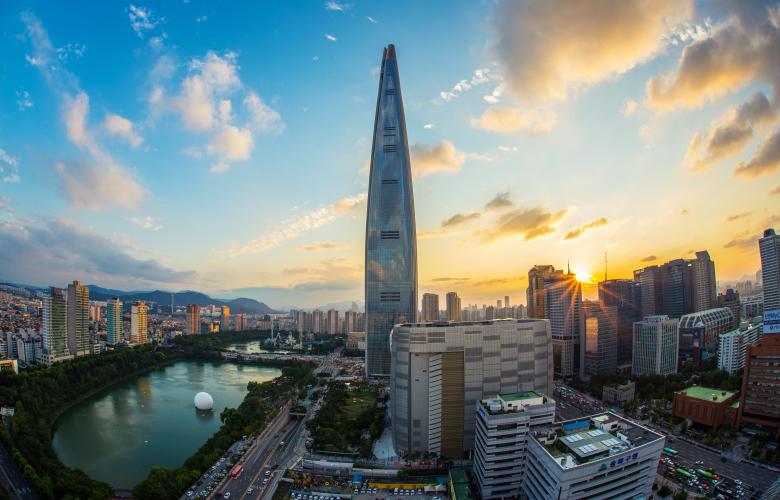‘Transaction volume continues to rise amid steady leasing activity across all sectors’ CBRE Korea
Contact
‘Transaction volume continues to rise amid steady leasing activity across all sectors’ CBRE Korea
CBRE Korea releases their Seoul Marketview Q2 2019 report
CBRE Korea, announced that commercial real estate transaction volume stood at 4.3 trillion won in Q2 2019, an increase of 38% q-o-q, according to CBRE Korea’s Q2 Marketview report. Commercial transaction volume totaled 7.5 trillion won in H1 2019, a rise of 11% y-o-y.
At a glance:
- Commercial real estate transaction volume stood at 7.5 trillion won, a rise of 11% y-o-y, in H1 2019
- Commercial property transaction volume totaled 4.3 trillion won in Q2 2019… an increase of 38% q-o-q
Don Lim, Managing Director of CBRE Korea, remarked, “The Korean commercial property investment market continued to witness robust activity in the first half, driven by several major deals for office and logistics assets.”
Claire Choi, Head of Research at CBRE Korea, said, “Despite the addition of new supply, end-users continue to find it challenging to secure high-quality logistics facilities in optimal locations to meet their business requirements. As a result, more end-users are diversifying their expansion strategy by considering developing their own logistics facilities as well as leasing additional logistics centers.”
Office
Grade A office buildings in Seoul’s three major business districts saw steady leasing activity, and average effective rents in Q2 2019 were unchanged. Vacancy in the Central Business District (CBD) rose by 2.3%pt on the addition of new supply and vacancies due to relocation. Gangnam Business District (GBD) and Yeouido Business District (YBD) recorded firm Grade A leasing activity in Q2 2019, with vacancy falling by 1.7%pt and 2.2%pt, respectively. Rents declined marginally in the CBD due to the addition of new supply, while those in the GBD and YBD were stable as buildings that had recently filled vacant space reduced incentives.
Retail
Retail sales volume for Q1 2019 stood at 90.3 trillion won, representing growth of 3.2% y-o-y, but a decline of 4.8% q-o-q. As in the previous quarter, growth was driven by duty-free sales, which rose 27% y-o-y, followed by non-store retail, which was up 13.8% y-o-y. Mobile sales continued to strengthen, now accounting for 63.6% of total online sales. F&B retailers drove leasing demand in Q2 2019, spearheaded by specialty coffee brands followed by the opening of U.S. brand Blue Bottle’s first Korean store in May. In addition, more brick-and-mortar retailers, especially in sportswear, consumer electronics and furniture brands, are increasing store size while providing more locations within stores for consumers to experience their products to overcome lack of sales and visitor decline in offline stores.
Industrial
Industrial and logistics transaction volume totaled 656.7 billion won in Q2 2019 as several major assets changed hands. Three new Grade A logistics assets were completed in the Greater Seoul area in Ansan, Pyeongtaek and Icheon. Despite the addition of new supply, many end-users continue to find it challenging to secure high-quality logistics facilities in optimal locations to meet their business requirements. As a result, more end-users are diversifying their expansion strategy. Additionally, traditional industrial and logistics hubs such as Yongin and Icheon are tightening approvals of new development projects due to complaints from the public and the lack of suitable land. Therefore, development is shifting to nearby cities such as West Anseong and Yeoju.
Investment
Commercial real estate transaction volume totaled 4.3 trillion won, an increase of 38% q-o-q. H1 2019 transaction volume stood at 7.5 trillion won, a rise of 11% y-o-y. Several major Grade A office transactions were completed this quarter, mainly in the CBD including State Tower Namsan, Eulji Twin Tower and Jongro Tower. Several major Grade A logistics assets were also transacted this quarter, including two logistics assets in Icheon. Additionally, Bank of Korea’s base interest rate cut will encourage more purchasing activity in the coming months.
Click here to download the CBRE Korea Seoul Marketview Q2 2019 report
Source: CBRE Korea
Similar to this:
Seoul investment market remains active amid steady leasing activity
CBRE Korea releases 2019 Korea Occupier Survey
CBRE Korea hosts ‘CBRE Forum 2019’ for real estate investors and industry experts






